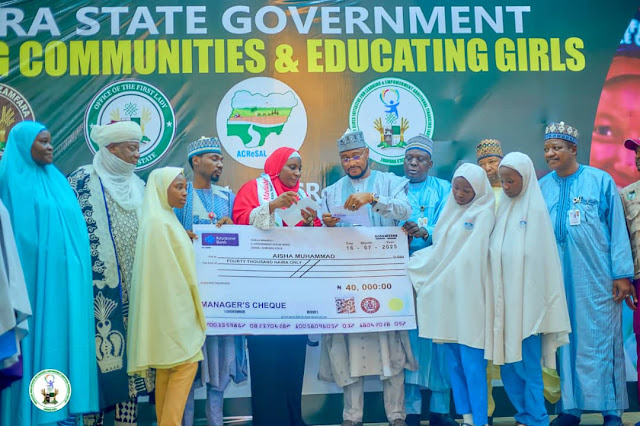By Husaini Yero, Gusau The Zamfara State Ministry of Education, Science, and Technology has released a comprehensive update on the ongoing...
By Husaini Yero, Gusau
The Zamfara State Ministry of Education, Science, and Technology has
released a comprehensive update on the ongoing implementation of the Adolescent
Girls Initiative for Learning and Empowerment – Additional Financing (AGILE-AF)
project, highlighting notable progress across several components aimed at
improving access to quality education for girls in the state.
The report, presented to the State Project Steering
Committee (SPSC) in July 2025, was coordinated by the Permanent Secretary,
Sa’adatu Abdu Gusau, who also serves as the Zamfara State AGILE Coordinator.
Under project Components 1.1 and 1.2, efforts
have been concentrated on upgrading school infrastructure prototypes, with
clearance already secured from the World Bank. Improvements are ongoing,
addressing observations raised in the Environmental and Social Management Plan
(ESMP). The state recorded key achievements in this regard, including the renovation
of classroom blocks at Government Day Secondary School (GDSS) Chakal and GDSS
Yarkofoji.
Progress has also been made in promoting
transparency and accountability, particularly through the publication of the
list of School Improvement Grant (SIG) beneficiaries. This development is
expected to enhance the credibility and reach of educational support funds
across participating schools.
Component 2.1 of the project has seen the
deployment of third-party tracking mechanisms and extensive stakeholder engagements,
aimed at strengthening monitoring processes and ensuring community
participation in project implementation. The inclusion of voices from parents,
education officials, and local communities remains central to the project’s
delivery framework.
Further progress has been made under Component 2.2, which focuses on empowering adolescent girls through
life skills and digital literacy. At the Huriya Dauda Women and Vocational
Centre in Gusau, educational resource materials were distributed to support
learning, with significant improvements documented through visual comparisons.
This initiative continues to equip girls with vocational skills, digital tools,
and essential competencies to enhance long-term socio-economic resilience.
A major milestone in the implementation is the
rollout of Conditional Cash Transfers (CCTs) under Component 2.3. The first
disbursement benefited 7,326 primary six (P6) girls and 6,681 junior secondary
school (JSS3) girls upon registration. A second disbursement followed, covering
termly fees as these students transitioned into Junior Secondary School 1
(JSS1) and Senior Secondary School 1 (SS1) respectively. The financial support
is aimed at reducing dropout rates and facilitating smooth progression through
critical stages of formal education.
In the area of social safeguards, under
Components 3.1 and 3.2, the project is currently updating key instruments to
enhance inclusivity and ensure protection of all beneficiaries. Beyond planned
activities, the project team has also initiated a Back-to-School campaign to
identify and re-enrol out-of-school children, reaffirming Zamfara State’s
commitment to inclusive education.
Permanent Secretary Sa’adatu Abdu Gusau
reiterated the state’s commitment to the AGILE-AF vision, expressing
satisfaction with the visible impact of the program. “We are witnessing
transformative changes, not just in infrastructure, but in the lives and
aspirations of our girls,” she said.
With
data-driven planning, active community participation, and targeted interventions,
the AGILE-AF project in Zamfara continues to push forward its mission of
expanding educational opportunities and empowering adolescent girls across the
state.



















No comments